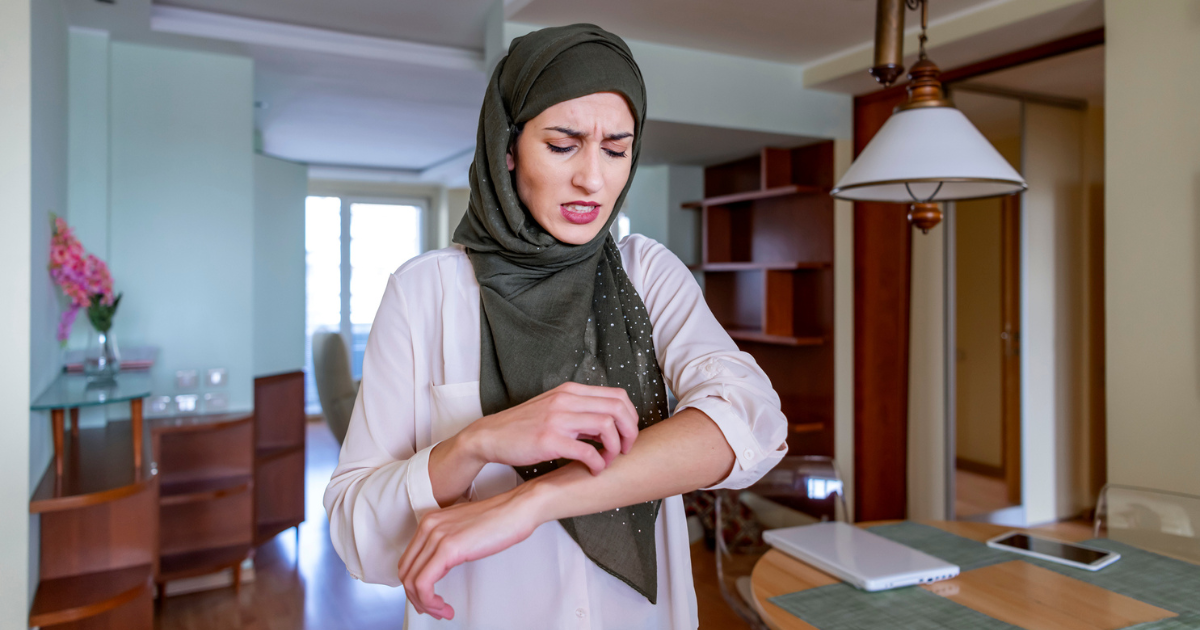6 signs you may have psoriasis

When the weather gets colder and allergies begin to act up, dry and itchy skin is a reality for many. But when should there be a cause for concern?
Psoriasis is a skin disease that involves thick, scaly, raised plaques. They might be mistaken for eczema or dermatitis initially, but psoriasis has more tell-tale signs and symptoms than some realize. Sarah Lonowski, MD, MBA, Nebraska Medicine dermatologist, tells us what to look for if you suspect you may have psoriasis:
1. The parts of the body involved
“The elbows, knees, scalp, and lower back are common locations, but you can find psoriasis anywhere,” says Dr. Lonowski.
Several subtypes of psoriasis affect different body areas. Plaque psoriasis, Dr. Lonowski says, is the most common type. Inverse psoriasis refers to psoriasis in the skin folds such as the groin, armpits, and under the breasts.
Additionally, a more severe form of psoriasis can involve the whole body and cause chills, fever, and dehydration.
“The most severe type of psoriasis is erythrodermic psoriasis, where more than 80% of the body is involved and can require hospitalization,” says Dr. Lonowski.
2. The shape and distribution of the lesions
Psoriasis plaques can come in various shapes and sizes, often round or oval. It involves the outer parts of the body, such as elbows and knees, while eczema usually involves the inner arms, behind the knees, and neck folds.
“Classically, psoriasis on the skin is well-demarcated and has very clear borders showing where the rash begins and ends. With eczema, it’s ill-defined and not as clear,” says Dr. Lonowski.
3. Scales on the rash and flaking
“Early signs would be an onset of a scaly, sometimes itchy rash. It’s pink and has a thick white scale on top,” says Dr. Lonowski. “Some patients have psoriasis only on the scalp, which can lead to itching and flaking.”
Psoriasis flakes can resemble dandruff. Layers peel off, which causes the scaling effect. It’s best to avoid picking or peeling psoriasis scales as that can trigger flare-ups.
4. Nail pitting
Yes, psoriasis can affect the nails, and it’s possible to have nail psoriasis without psoriasis on the skin. It can also signify having psoriatic arthritis, though many patients with nail psoriasis do not have joint involvement.
“With nail psoriasis, there are some common nail changes such as pits in the nails, which look like tiny dents,” says Dr. Lonowski.
Nails can also have yellow discoloration, become brittle, rough and separate from the skin.
5. Triggers
“A certain type of psoriasis called guttate psoriasis, characterized by smaller coin-shaped spots on the body, can be triggered by an infection such as strep throat,” says Dr. Lonowski. “Certain medications like beta-blockers can be associated with a psoriasis flare-up.”
There is also a link between psoriasis and stress, Dr. Lonowski says. Stress can worsen psoriasis, and the psoriasis flare-ups can cause stress.
6. Joint pain
“Psoriatic arthritis refers to an autoimmune arthritis that some with psoriasis on the skin may have,” says Dr. Lonowski. It’s estimated that psoriatic arthritis affects between 5% to 30% of patients with psoriasis.
Psoriatic arthritis, like psoriasis, has a possible genetic predisposition and can flare and subside. It can cause lower back pain, morning stiffness, swollen fingers and fatigue.
Identifying and treating psoriasis as early as possible is critical. There’s no cure for psoriasis, but symptoms can be managed and controlled.
“Some people, even if they live a perfectly healthy lifestyle, will still get psoriasis,” says Dr. Lonowski. “The number of treatments has increased dramatically – they range from topical treatments like creams, ointments, and shampoos to oral, injectable and infused medications.”
A specialty psoriasis clinic is available weekly with Dr. Lonowski at the Nebraska Medicine Westroads Clinic. A multidisciplinary clinic for psoriasis and psoriatic arthritis patients is scheduled once a month with Dr. Lonowski and rheumatologist Brent Leudders, MD. Call 402.552.7928 to make an appointment. Call 800.922.0000 or schedule online for an appointment with a dermatologist.



